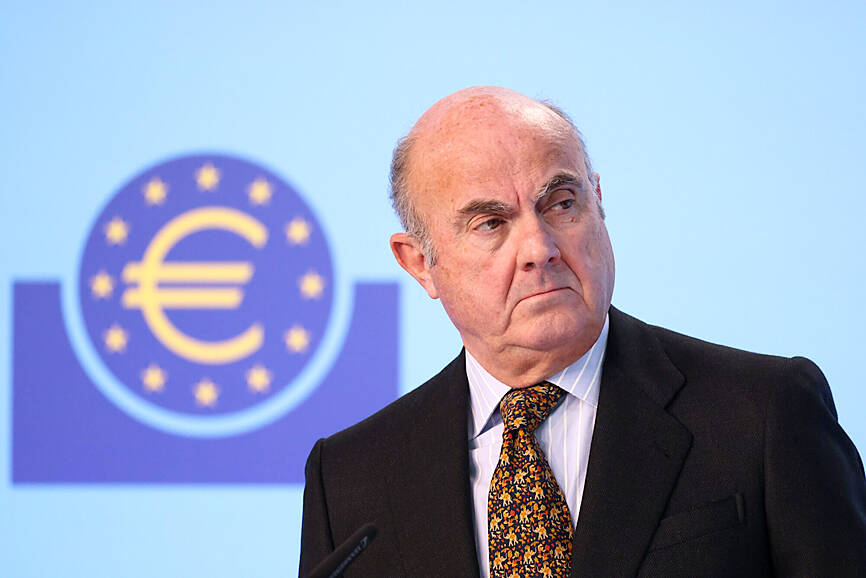US President Donald Trump’s policies are causing more uncertainty for the economy than there was during the COVID-19 pandemic, European Central Bank (ECB) Vice President Luis de Guindos told the Sunday Times.
“We need to consider the uncertainty of the current environment, which is even higher than it was during the pandemic,” he was cited as saying. “What we’re seeing is that the new US administration isn’t very open to continuing with multilateralism, which is about cooperation across jurisdictions and finding common solutions for common problems. This is a very important change, and a big source of uncertainty.”
Several ECB policymakers have highlighted their worry about the impact of a brewing trade war over the past few days with ECB President Christine Lagarde saying an escalation of disputes over trade levies might have a detrimental effect on the world economy.

Photo: Bloomberg
Similarly, Bank of Spain Governor Jose Luis Escriva on Friday told Bloomberg TV that assumptions for inflation and economic growth face big risks in each direction and that such unpredictability makes it impossible to predict further interest-rate moves.
In the euro area, growth is expected to expand just 0.9 percent this year, according to ECB forecasts published this month.
“Real wages have increased, inflation is declining, interest rates are coming down and financing conditions are better,” Guindos said. “But still, the reality is that consumption is not picking up.”
“This is because consumers don’t always react to developments in their short-term real disposable income,” he said. “They also consider what might happen with the economy over the medium term, which is clouded in uncertainty. The possibility of a trade war or wider geopolitical conflict has an impact on consumer confidence.”
Asked about the massive defense spending plans from European governments, Guindos said “this is certainly a decision in the right direction,” though it is too early to draw definite economic conclusions.
Still, “it will likely be positive for growth and have a limited impact on inflation,” he said.
Guindos reiterated the ECB’s confidence that inflation is on track toward the central bank’s 2 percent goal at “the end of this year or the beginning of next,” saying that “all indicators for services and underlying inflation are moving in the right direction.”
He particularly highlighted the slowdown in compensation per employee, which eased in the fourth quarter.

SEMICONDUCTORS: The German laser and plasma generator company will expand its local services as its specialized offerings support Taiwan’s semiconductor industries Trumpf SE + Co KG, a global leader in supplying laser technology and plasma generators used in chip production, is expanding its investments in Taiwan in an effort to deeply integrate into the global semiconductor supply chain in the pursuit of growth. The company, headquartered in Ditzingen, Germany, has invested significantly in a newly inaugurated regional technical center for plasma generators in Taoyuan, its latest expansion in Taiwan after being engaged in various industries for more than 25 years. The center, the first of its kind Trumpf built outside Germany, aims to serve customers from Taiwan, Japan, Southeast Asia and South Korea,

Gasoline and diesel prices at domestic fuel stations are to fall NT$0.2 per liter this week, down for a second consecutive week, CPC Corp, Taiwan (台灣中油) and Formosa Petrochemical Corp (台塑石化) announced yesterday. Effective today, gasoline prices at CPC and Formosa stations are to drop to NT$26.4, NT$27.9 and NT$29.9 per liter for 92, 95 and 98-octane unleaded gasoline respectively, the companies said in separate statements. The price of premium diesel is to fall to NT$24.8 per liter at CPC stations and NT$24.6 at Formosa pumps, they said. The price adjustments came even as international crude oil prices rose last week, as traders

SIZE MATTERS: TSMC started phasing out 8-inch wafer production last year, while Samsung is more aggressively retiring 8-inch capacity, TrendForce said Chipmakers are expected to raise prices of 8-inch wafers by up to 20 percent this year on concern over supply constraints as major contract chipmakers Taiwan Semiconductor Manufacturing Co (TSMC, 台積電) and Samsung Electronics Co gradually retire less advanced wafer capacity, TrendForce Corp (集邦科技) said yesterday. It is the first significant across-the-board price hike since a global semiconductor correction in 2023, the Taipei-based market researcher said in a report. Global 8-inch wafer capacity slid 0.3 percent year-on-year last year, although 8-inch wafer prices still hovered at relatively stable levels throughout the year, TrendForce said. The downward trend is expected to continue this year,

POWERING UP: PSUs for AI servers made up about 50% of Delta’s total server PSU revenue during the first three quarters of last year, the company said Power supply and electronic components maker Delta Electronics Inc (台達電) reported record-high revenue of NT$161.61 billion (US$5.11 billion) for last quarter and said it remains positive about this quarter. Last quarter’s figure was up 7.6 percent from the previous quarter and 41.51 percent higher than a year earlier, and largely in line with Yuanta Securities Investment Consulting Co’s (元大投顧) forecast of NT$160 billion. Delta’s annual revenue last year rose 31.76 percent year-on-year to NT$554.89 billion, also a record high for the company. Its strong performance reflected continued demand for high-performance power solutions and advanced liquid-cooling products used in artificial intelligence (AI) data centers,